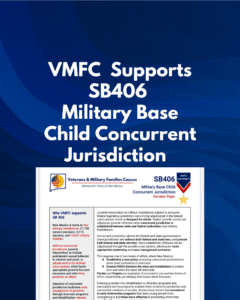Juvenile misconduct on military installations subject to exclusive federal legislative jurisdiction can only be adjudicated in the federal court system, which is designed for adults. States’ juvenile courts can adjudicate juvenile offenses when concurrent jurisdiction is established between state and federal authorities over military installations.
Concurrent jurisdiction allows the federal and state government to share jurisdiction and enforce both federal and state laws, and provide both federal and state services. Once established, offenses can be adjudicated through the juvenile court system, allowing for more appropriate sentencing and case management outcomes.
This requires one or two levels of effort, where New Mexico:
- Establishes a new policy accepting concurrent jurisdiction to allow state authorities to intercede.
- Creates MOUs between the state and installations to dictate how and when the state will intercede.
Florida and Virginia are examples of successful one and two levels of effort, respectively, per Military One Source Best Practices.
READ OUR COMPLETE PRESS RELEASE HERE
